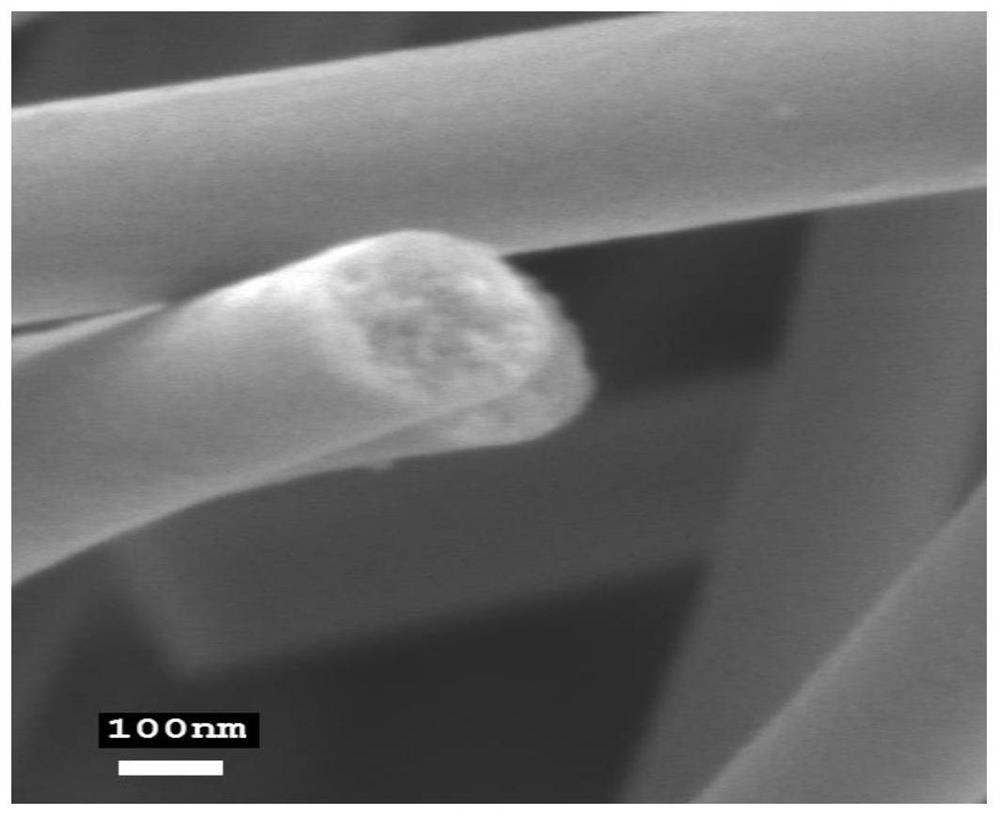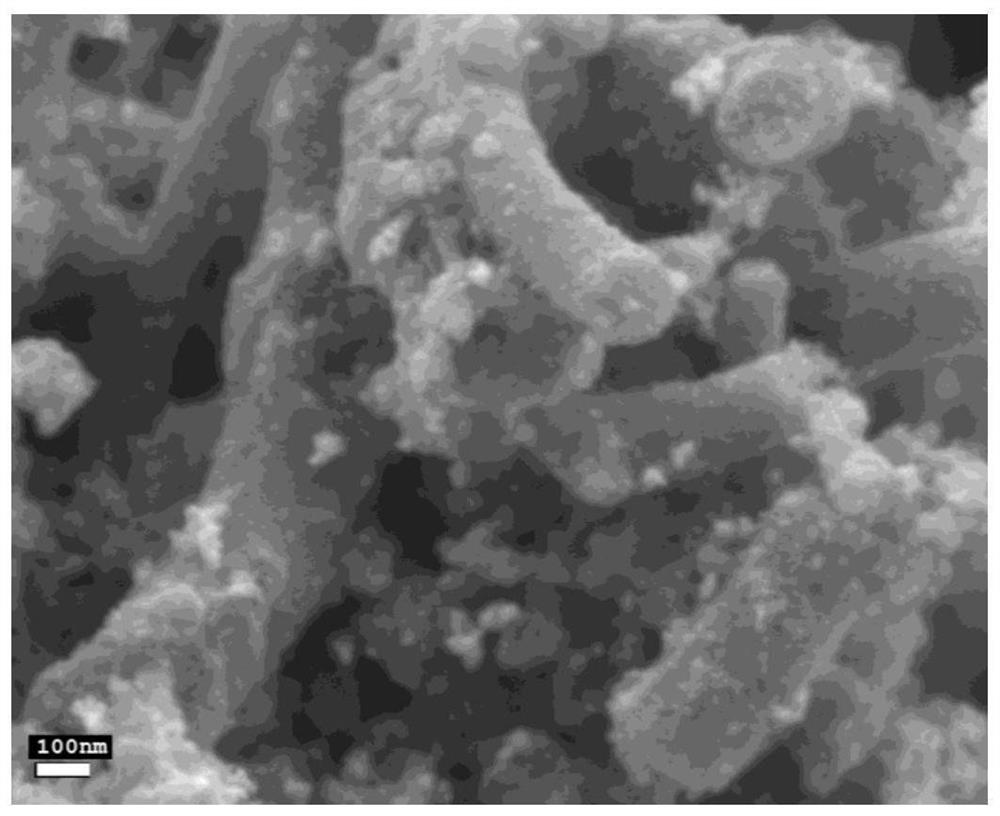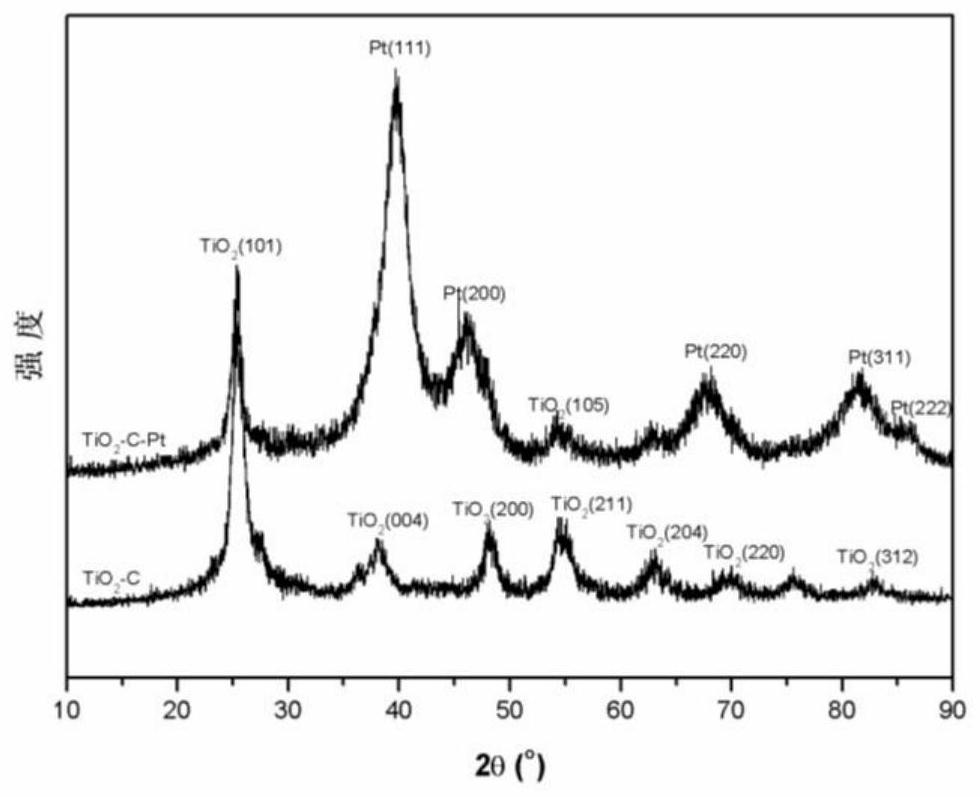Composite material and catalyst supported by composite material and its preparation and application
A technology of composite materials and catalysts, applied in the direction of catalyst carriers, physical/chemical process catalysts, metal/metal oxide/metal hydroxide catalysts, etc., can solve problems such as poor conductivity, small specific surface area, and complicated preparation methods
- Summary
- Abstract
- Description
- Claims
- Application Information
AI Technical Summary
Problems solved by technology
Method used
Image
Examples
Embodiment 1
[0028]Weigh 0.2g of carbon powder (XC-72R carbon powder) and ultrasonically disperse it in 8g of ethanol, then add it to the ethanol solution of polyvinylpyrrolidone (the content of polyvinylpyrrolidone is 7.4wt.%), stir while ultrasonically, and then add 2g of acetic acid, then add 1g of butyl titanate, stir for 2 hours to get a black spinning solution, put it into a syringe after static defoaming, and then fix it on the electrospinning workbench, the distance between the workbench and the roller or stainless steel plate The feeding speed of the spinning solution is 0.02mm / min, the working voltage of 20kV is applied, and the aluminum foil is fixed on the roller to collect the fibers. The rotation speed of the roller is 120rpm, or 100-300rpm. Finally, the fibers were removed from the aluminum foil paper, put into a muffle furnace and calcined at 400°C for 4 hours to obtain titanium oxide-carbon (TiO 2 -C) Nanofibers. figure 1 For the prepared TiO 2 -SEM image of C.
[0029]...
Embodiment 2
[0031] One-step preparation of TiO by electrospinning 2 -C-Pt electrocatalyst: Weigh 0.2g of carbon powder (XC-72R carbon powder) and ultrasonically disperse it in 10g of ethanol, then add it to the ethanol solution of polyvinylpyrrolidone (the content of polyvinylpyrrolidone is 10wt.%). Stir while ultrasonic, then add 2 g of acetic acid, then add 1 g of butyl titanate, stir for 2 hours, then add 0.15 g of chloroplatinic acid ethanol solution (the concentration of chloroplatinic acid solution is 0.15 g / mL) dropwise to the above black solution In the final spinning solution is obtained. Subsequently, the spinning solution was left to defoam and then moved into a syringe for electrospinning, as in Example 1, and finally the obtained fibers were put into a muffle furnace for 350°C for 2 hours, and the Ti salt and the Pt salt were decomposed while the polymer was decomposed. decomposed into TiO 2 and Pt, and finally get TiO 2 -C-Pt electrocatalysts. Figure 4 The XRF character...
PUM
| Property | Measurement | Unit |
|---|---|---|
| diameter | aaaaa | aaaaa |
| electrical conductivity | aaaaa | aaaaa |
| porosity | aaaaa | aaaaa |
Abstract
Description
Claims
Application Information
 Login to View More
Login to View More - R&D
- Intellectual Property
- Life Sciences
- Materials
- Tech Scout
- Unparalleled Data Quality
- Higher Quality Content
- 60% Fewer Hallucinations
Browse by: Latest US Patents, China's latest patents, Technical Efficacy Thesaurus, Application Domain, Technology Topic, Popular Technical Reports.
© 2025 PatSnap. All rights reserved.Legal|Privacy policy|Modern Slavery Act Transparency Statement|Sitemap|About US| Contact US: help@patsnap.com



